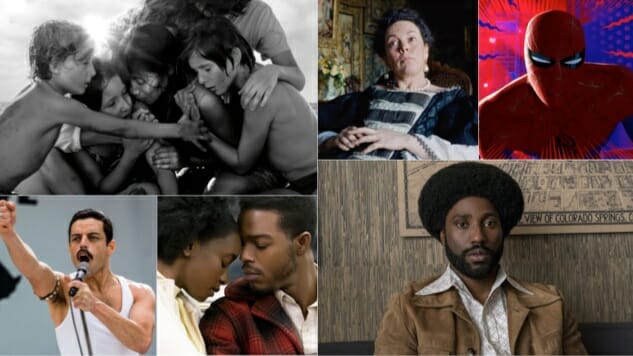2019 Oscars Preview: Who Will Win and Who Should Win

By most measures, 2018 was an amazing year at the movies. The Age of the Superhero films may have caused genre-fatigue for some critics (and movie-goers), but it supercharged the box office. (Six of the top 10 films domestically were super-powered—seven if you count the ability of Tom Cruise’s Ethan Hunt to shrug off concussive force and bone-breaking impact.) Meanwhile, there was no shortage of wonderful, thought-provoking films that may not have brought in billions worldwide, but which were noticed and lauded by critics even if the general public missed on them initially. (Many of these were directed, written and otherwise brought to life by women and minorities—the very groups Hollywood has such an established track record of ignoring, appropriating the stories of and otherwise slighting.) Enter the 2019 Academy Awards—or not. Instead of a collection of critical darlings coupled with a few box office faves, we got, well … wow, what a mess. While there are snubs every year, 2019’s edition of Gold Statuette bingo seems particularly determined to generate as many WTFs as possible. Movies, performances, directors—it seems like every marquee category has multiple missing pieces. This year especially, women—and especially women directors—were just outright ignored. (We won’t even go into the fascinating string of bad decisions announced and then reversed.)
Maybe the chaos is a good thing—or at least a sign of a good thing. Maybe there’s a sea change finally taking effect within the voting ranks and the weird whiffs (Won’t You Be My Neighbor?), and occasional pockets of “Old School” determination (Bohemian Rhapsody and Green Book) reflect a fissured foundation that will need to resettle before we can trust that a Moonlight may, indeed, beat out a La La Land and quality genre fare like The Shape of Water truly compete, when deserved, with more traditional Oscar bait. (It might be time to try some new bait?)
Or it could just be a strange year. We aren’t here to defend any of this.
Nonetheless, there are Oscar parties to go to and ballots to fill out. For that, we’re here to help. You can check out our handy streaming guide to help you catch up with as many nominees as possible.
Keep an eye on the site on Sunday to follow along with live updates, as well as on our Twitter profile to find out what the film community’s yammering on about.
And if you’re looking for more, check out some of our Oscars-related and -adjacent articles and all the writing done in the past year about Oscar-nominated films:
In Defense of Vice by Matt Brennan
Why Are Indian Films Rarely Recognized at the Oscars? by Radhika Menon
From Beale Street to Wakanda by Kenneth Lowe
Disney’s Year of Re-Imagineering by Kenneth Lowe
In 2018, Kids Got the Superhero Movies They Deserve by Kenneth Lowe
First Man, Last Chance by Dom Sinacola
Let’s Talk about Love: The Films of Yorgos Lanthimos by Kyle Turner
Typed Face: Can You Ever Forgive Me? and Literary Drag by Kyle Turner
Vox Lux Is about Lady Gaga Too by Kyle Turner
The Transcendence of First Reformed by Chad Betz
A Room of One’s Own: Paul Schrader’s Queered Masculinity by Kyle Turner
Original Screenplay

Nominated:
The Favourite, Deborah Davis and Tony McNamara
First Reformed, Paul Schrader
Green Book, Nick Vallelonga, Brian Currie and Peter Farrelly
Roma, Alfonso Cuarón
Vice, Adam McKay
Who Will Win: The Favourite, Deborah Davis and Tony McNamara
Who Should Win: First Reformed, Paul Schrader
A Grade A Snubbing: Eighth Grade, Bo Burnham
One of the most thoughtful narrative features of the last year, Eighth Grade really captures the essence of adolescence in the digital age—and that begins with the extraordinary screenplay by Bo Burnham. From the stammering YouTube confessionals by Kayla (played to perfection by Elsie Fisher) to her awkward interactions with her cool classmates (bringing one a certain level of internal nostalgic dread), each scripted moment gives a glimpse of Kayla as a genuine person with dreams and interests and flaws, her interpersonal relationships (most notably, the occasionally tenuous one with her single father played by Josh Hamilton) given as much attention and detail. Burnham truly seems to be able to get inside the mind of a shy and anxious young girl. That he does so with such empathy and compassion, is transportive. —Radhika Menon
Sorry to Snub You: Sorry to Bother You, Boots Riley
A nomination for Best Original Screenplay would have been the ideal way to recognize a bright new talent in the form of hip-hop producer/activist Boots Riley, who wrote what might well be 2018’s most subversively funny and outright weird script. The genius of Sorry to Bother You is how its absurdist, fantastical streak heats itself up so slowly that the audience barely notices things beginning to simmer and fray at the edges before its (truly bonkers) third-act reveal. Riley presents us with a world that at first seems so recognizably like our own that the audience is left in an uncanny valley between satire and farce by the film’s end—itself seemingly a metaphor for the way our own society is able to rapidly normalize the objectively disturbing. Certainly, a nomination for Sorry to Bother You would have rewarded one of the year’s most purely ambitious, original and fearless endeavors in film writing. —Jim Vorel
Adapted Screenplay

Nominated:
The Ballad of Buster Scruggs, Joel Coen and Ethan Coen
BlacKkKlansman, Charlie Wachtel, David Rabinowitz, Kevin Willmott and Spike Lee
Can You Ever Forgive Me?, by Nicole Holofcener and Jeff Whitty
If Beale Street Could Talk, by Barry Jenkins
A Star Is Born, by Eric Roth, Bradley Cooper and Will Fetters
Who Will Win: BlacKkKlansman
This year feels like it may hold some belated Spike Lee appreciation. Sure, 30 years after Driving Miss Daisy took home Best Picture while Do the Right Thing was not even nominated, Lee’s latest movie is facing another film espousing a chauffeur-based solution to racism. Still, in a year where we hope to god Green Book doesn’t take home the top prize, it seems likely neither will Lee. We suspect voters will lean toward Lee in this category, even as we wish they had chosen that other powerful (and more nuanced) indictment of systemic racism, Barry Jenkins’ If Beale Street Could Talk. —Michael Burgin
Who Should Win: If Beale Street Could Talk
Actress in a Supporting Role

Nominated:
Amy Adams, Vice
Marina de Tavira, Roma
Regina King, If Beale Street Could Talk
Emma Stone, The Favourite
Rachel Weisz, The Favourite
Who Will Win: Regina King
For all the talk of snubs and misfires, this is one category where the “Will Win” and “Should Win” align nicely under one royal name.
Who Should Win: Regina King
Costume Design

Nominated:
The Ballad of Buster Scruggs, Mary Zophres
Black Panther, Ruth E. Carter
The Favourite, Sandy Powell
Mary Poppins Returns, Sandy Powell
Mary Queen of Scots, Alexandra Byrne
Who Will Win: Ruth E. Carter for Black Panther
This is a pretty standout category this year, but even as the Academy balks at giving Black Panther more than a nomination for Best Picture, it will at least provide a “consolation” prize or two in the smaller categories. There’s nothing consolatory about Carter or the skills that will earn her an Oscar—in her nearly three decades, Carter has worked for Spike Lee, Steven Spielberg, Ava DuVernay and more, and her afrofuturist designs for Wakanda were yet another catalyst in the cinematic jet fuel that propelled Black Panther to popular and critical acclaim. —Michael Burgin
Who Should Win: Ruth E. Carter for Black Panther
Production Design

Nominated:
Black Panther, Hannah Beachler
First Man, Nathan Crowley and Kathy Lucas
The Favourite, Fiona Crombie and Alice Felton
Mary Poppins Returns, John Myhre and Gordon Sim
Roma, Eugenio Caballero and Bárbara Enriquez
Who Will Win: Hannah Beachler for Black Panther
Though it will likely be excluded from a Best Picture win, Black Panther will leave its mark on the ceremonies. So should Beachler. —Michael Burgin
Who Should Win: Hannah Beachler for Black Panther
Makeup and Hairstyling

Nominated:
Border, Göran Lundström, Pamela Goldammer
Mary Queen of Scots, Jenny Shircore, Marc Pilcher, Jessica Brooks
Vice, Greg Cannom, Kate Biscoe, Patricia Dehaney
Who Will Win: Vice
In (clap) this (clap) house (clap) we (clap) stan (clap) famous actors who gain a lot of weight to look remotely like war criminals (clap). —Dom Sinacola
Who Should Win: Mary Queen of Scots
Cinematography

Nominated:
Cold War, Lukasz Zal
The Favourite, Robbie Ryan
Never Look Away, Caleb Deschanel
Roma, Alfonso Cuarón
A Star Is Born, Matthew Libatique
Who Will Win: Roma, Alfonso Cuarón
Who Should Win: Roma, Alfonso Cuarón
For all of Zal’s hyper-rich black-and-white buffeted by empty space speaking to even richer inner lives, transforming the romanticism of Cold War into something religious, and for all the magnificent musical performances Libatique captures perfectly in sync with Bradley Cooper’s vision for an intimate story about people who are now in a tax bracket that no longer afford intimacy, Roma is a film that without its astounding tableaus and effortless framing would feel like little more than an apologia for inherited wealth. Cuarón’s images transcend the mundane into vessels of symbolism, conjure drama from the ordinary and paint history in broad, deeply felt strokes—like memory, or like a Tati film—suffusing every object with lifetimes of meaning. —Dom Sinacola
Film Editing

Nominated:
BlacKkKlansman, Barry Alexander Brown
Bohemian Rhapsody, John Ottman
Green Book, Patrick J. Don Vito
The Favourite, Yorgos Mavropsaridis
Vice, Hank Corwin
Who Will Win: Vice
No matter how many new voters the Academy has this year, some Oscars will always be drawn to category nominees that acquaint a voter’s “limited technical understanding” with the most obvious manifestation of the skillset. Does the average voter know what all goes into great film editing? How many small decisions work alongside the big ones to yield the greater narrative experience? Likely not. But can they look at a film like Vice and easily recognize editing going on? Yes, they can. —Michael Burgin
Who Should Win: The Favourite
Sound Editing

Nominated:
Black Panther, Benjamin A. Burtt and Steve Boeddeker
Bohemian Rhapsody, John Warhurst
First Man, Ai-Ling Lee and Mildred Iatrou Morgan
A Quiet Place, Ethan Van der Ryn and Erik Aadahl
Roma, Sergio Diaz and Skip Lievsay
Who Will Win: First Man
As far as any typical Oscar voter understands the difference between Sound Editing and Sound Mixing—the consensus among most viewers being, “Meh”—First Man lives and dies upon its immersive experience, meant to be seen on as big a screen as possible, its sound felt in the fibers of as prickly a theater chair as one can claim. This, one must assume, is all part of Damien Chazelle’s plan: to match Ryan Gosling’s near-somnambulant performance with an overwhelming sensual spectacle in order to achieve some sort of subcutaneous symmetry. Creating the sounds of space travel, making them both cinematic and realistic—making them feel genuine and genuinely awe-inspiring—is in essence what First Man seeks to do for the whole pioneering endeavor. First Man feels like the kind of film old-school voters will have caught up with late in the game, feeling justified in giving Chazelle so much praise two years ago, but not wanting to completely overlook a film that champions the quiet, unsung hero. It won’t win Best Visual Effects, but it won’t go hungry either. —Dom Sinacola
Who Should Win: First Man
Sound Mixing

Nominated:
Black Panther, Steve Boeddeker, Brandon Proctor, Peter Devlin
Bohemian Rhapsody, Paul Massey, Tim Cavagin, John Casali
First Man, Jon Taylor, Frank A. Montaño, Ai-Ling Lee, Mary H. Ellis
Roma, Skip Lievsay, Craig Henighan, José Antonio García
A Star Is Born, Tom Ozanich, Dean Zupancic, Jason Ruder, Steve Morrow
Who Will Win: Bohemian Rhapsody
The shitty music movie has got to win some sort of award having to do with “sound”—y’know, because: music—so why not this one? Don’t think about it too hard. Let’s move on. —Dom Sinacola
Who Should Win: First Man
Visual Effects

Nominated:
Avengers: Infinity War
Christopher Robin
First Man
Ready Player One
Solo: A Star Wars Story
Who Will Win: Avengers: Infinity War
Who Should Win: First Man
The Lost Snub of Atlantis: Aquaman
That Aquaman wasn’t even on the shortlist is something James Wan and his team should take very personally. While the sheer labor involved in rendering an undersea world, with which we spend at least two-thirds of a 140-minute eye-eviscerating extravaganza, astounds—as Wan said in an interview with Vulture, describing the work that went into something as mundane as hair, “We’d have to go back to the drawing board and re-render every single strand of hair. We’re talking, like, hours to render one shot that could only maybe be a couple of seconds long.”—the film itself ambitiously takes on, like, five things movies have never really tried before. Look only to Justice League barely one-and-a-half years before to witness how far Wan and his team had gone to make something that both felt, intuitively, believable and, as Wan declares more than once, just plain looked cool. Such a feat required elaborate rigs for actors to navigate in ridiculously obtrusive outfits, scrapping effects halfway through filming to accommodate a completely different look, undoubtedly multiple ulcers and disappointed family members, countless hours (lives) spent in front of computer screens paying attention to details no one would ever see, completely re-thinking the notion of movement in a superhero film, a genre already oversaturated with near-cosmic beings basically just flying everywhere—if the Oscars won’t at the very least acknowledge a successful film that simultaneously moves the industry forward (lucratively) and pleases audiences, populist and critical alike, then what, we ask ourselves every year regardless, what’s the fucking point? —Dom Sinacola
A Snubbed New World: Annihilation
Any good action film takes seriously the consequences of its inertial offerings. Easy enough: Why are these people doing what they’re doing? A bit harder: Where and how does this action sequence fit within the narrative? Impossible: What of a world filled with so much brutality? Annihilation leans into such similar purposing of its extravagance. Through the unnerving splendor of its visual effects it creates a whole ecosystem bent around the psychological arc of its doomed squad of soldiers and scientists, all the while never straying from the visceral spectacle that supports it. Annihilation is a horror film, after all. Equally gorgeous and confounding, as if watching is an act of feeling one’s brain forever catching up, the organisms created by director Alex Garland and his effects supervisor Andrew Whitehurst limn the screen with otherworldly wonder. Whitehurst, who previously won the Oscar for Garland’s Ex Machina, approaches his work on Annihilation as an obviously headier challenge, imagining a world of mutations cast in vibrant shades of the innermost sicknesses of those who enter it. Look only to the bear monster, an amalgamation of beast and those it’s consumed, riddled with suffering and the remnants of violent misunderstandings, a marvelous accomplishment of design and integration that holds the weight of real menace, moving and looking like a nightmare deserving our fear as much as our pity. Or look to the transformation of Tessa Thompson’s character, swallowed up by wildflowers because she has no desire to go any further. Or look to the final confrontation between Lena (Natalie Portman) and her mirror image, as well as the fantastical landscape outside of the lighthouse, trees that are crystals that are trees. Each image Garland and Whitehurst dream up carries the weight of the nightmares of the characters moving through it. Integral to their journeys, the film’s visual effects reflect characters’, and by extension the viewers’, psychologies while compelling them to move forward—or to admit defeat and get lost in the sumptuous illusion of it all. The harmony achieved in Ex Machina, between practical effects and CGI, between the real and the surreal, was only prelude to the indelible phantasmagoria found in Annihilation. —Dom Sinacola
Short Film (Animated)

Nominated:
Animal Behaviour, by Alison Snowden and David Fine
Bao, by Domee Shi
Late Afternoon, by Louise Bagnall
One Small Step, by Andrew Chesworth, Bobby Pontillas
Weekends, by Trevor Jimenez
Who Will Win: Bao
Who Should Win: Bao
Animated Feature Film

Nominated:
Incredibles 2, Brad Bird
Isle of Dogs, Wes Anderson
Mirai, Mamoru Hosoda
Ralph Breaks the Internet, Rich Moore, Phil Johnston
Spider-Man: Into the Spider-Verse, Bob Persichetti, Peter Ramsey, Rodney Rothman
Who Will Win: Spider-Man: Into the Spider-Verse (or we riot)
Who Should Win: Spider-Man: Into the Spider-Verse
Imagine being a Disney exec looking at the animation slate for 2018 and handicapping your chances for yet another Oscar. You’d feel fine if your only contender was a sequel to a very popular videogame-spoofing Wreck-It Ralph, but you’ve also got the long-awaited sequel to one of Pixar’s most beloved movies, The Incredibles. (Let’s assume it’s even after release, so you know Brad Bird and company have hit another one out of the park.) What could challenge that? The smaller profile stuff is out off the bat. Paddington 2 is a live-action mix, so, boom, not allowed in the same category. There may be some interesting fare from Japan, but it’s not Miyazaki, so you’re safe. Wes Anderson is doing … something. Eh, even if it’s Fantastic Mr. Fox levels of fun, something about stop-motion just doesn’t grab voter interest, and besides, we’re talking Incredibles 2, man. So, like, what else? Oh, Sony has a Spider-Man movie coming out at the end of the year, sure, and that guy from the The Lego Movie is involved … but, nah, it’s nothing. Sony’s hardly been a savvy steward of the property, and the late release, traditional-seeming animation and (hears synopsis), oh, man, they chose that storyline? Viewers are just going to be confused. Give Pixar the Oscar already!
Of course, our fictitious exec could not have known how astounding this particular take on the webbed one’s mythos would be, how non-traditional the “traditional” animation would end up, or just how exquisitely packaged and deftly spun the narrative would be. If there was any justice, Spider-Man: Into the Spider-Verse would be a ninth entry in the Best Picture category, but instead, we’ll have to settle for dashing Disney’s hopes. (This is not meant to disparage the achievement of Incredibles 2—pulling off a sequel with those expectations was itself a feat to praise—it was just the second most impressive feat in animation in 2018.) —Michael Burgin
Actor in a Supporting Role

Nominated:
Mahershala Ali, Green Book
Adam Driver, BlacKkKlansman
Sam Elliott, A Star Is Born
Richard E. Grant, Can You Ever Forgive Me?
Sam Rockwell, Vice
Who Will Win: Mahershala Ali
Who Should Win: Richard E. Grant
If a Snubbed Year Could Talk: Brian Tyree Henry
Four times in a single year, Brian Tyree Henry gave performances worthy of statues. In Spider-Man: Into the Spider-Verse, he gave voice to Miles Morales’s father, Jefferson Davis. In Widows, he played a violent career criminal, Jamal Manning, hoping to break into Chicago politics. In Atlanta, he played clinically depressed rapper Alfred “Paper Boi” Miles. Finally, he gave his best performance of the year in a twelve-minute span of If Beale Street Could Talk. How did he walk away with zero Oscar nods?
The bane of any good actor is that their talents can often be difficult to detect. Henry hasn’t taken on a single character who carries around obvious stressors. There is no gnashing of teeth, nor great wails at the feet of a lover. Instead, a painful reality mixed with eager love he stitches through the lining of each character’s visual coat. He almost never yells, nor does he speak in a rush. Physically, there isn’t much difference in Henry’s approach to Jamal Manning and Alfred Miles. Both characters have criminal pasts, both pursuing careers for survival, and yet it would be impossible to confuse the two men. Miles carries the sort of pain thrust upon a person, the kind that can never be escaped. Manning’s injuries are mostly self-inflicted, and instead of causing him pain, they fuel his desires. Henry embodies the differences in gentle gestures and vividly expressive eyes.
The body of work quickly accumulating behind Henry will no doubt serve as a monument of his talent to future generations. But everyone deserves their roses in their time. To overlook a talent like Henry’s is akin to sin. —Joelle Monique
Documentary (Short Subject)

Nominated:
Black Sheep, Ed Perkins
End Game, Rob Epstein, Jeffrey Friedman
Lifeboat, Skye Fitzgerald
A Night at the Garden, Marshall Curry
Period. End of Sentence., Rayka Zehtabchi
Who Will Win: Black Sheep
Who Should Win: Lifeboat
Every nominated short deserves the relatively short time it takes to watch, each story a worthy winner, told with respect and humanity, shouldering the weight of history without steering to readily into pedanticism. But Lifeboat, maybe, bears the most urgency. If you want to do something about the suffering you’ve witnessed in this film, you can do something right now. It acts as a call to direct action: Donate to or volunteer for the nonprofit with which director Skye Fitzgerald collaborated; work with organizations struggling at our borders; sponsor refugee families. While Black Sheep delicately examines racism and the internalization of that violence, and A Night at The Garden shines a brief light on a glaring blindspot in our country’s history, brightened exponentially by the very real threat of white nationalism right now, Lifeboat most speaks to lives hanging in the balance at this moment, pointing to a concrete way to help in the immediacy of a global crisis. Maybe that’s a callous way of picking a “Should Win,” but, as so many of these shorts seem to say, resigned to the monstrous, dehumanizing course of history: Here we are; this is what we do now. —Dom Sinacola
Documentary (Feature)

Nominated:
Free Solo, by Jimmy Chin and Elizabeth Chai Vasarhelyi
Hale County This Morning, This Evening, by RaMell Ross
Minding the Gap, by Bing Liu
Of Fathers and Sons, by Talal Derki
RBG, by Betsy West and Julie Cohen
Who Will Win: Free Solo
Who Should Win: Minding the Gap
In a year rich with slice-of-life glimpses at pubescence in flux care of the arrested development of skateboard crews, Minding the Gap is undoubtedly the best of its cinematic ilk—not because it’s “real,” but because it’s so clearly focused on interrogating the toxicity that keeps these kids from truly growing up. In Rockford, Illinois, just a smidge too far outside of Chicago to matter, three kids use Liu’s camcorder to chronicle their days spent avoiding responsibility and the economic devastation suffered by so many Rust Belt cities of its kind: Zack, a cute and reckless elder of the crew, about to embark on fatherhood with his (noticeably younger) girlfriend, Nina; Keire, a seemingly always-grinning black kid who stays stiffly quiet whenever Zack claims that he has permission to use certain racial epithets, or when another kid insists that white trash kids have it the same as black kids; and Bing, the director himself, one of the few from his friend group able to escape Rockford. Splicing nostalgic footage of their time skating with urgent documents of their burgeoning adult life, Liu builds a portrait of the modern male in Middle America, lacing ostensibly jovial parties and hang-outs with shots of Rockford billboards vilifying absentee parents and pleas from Nina not to tell Zack that she admitted on-camera he’s hit her. As Liu discovers more and more about the abuse indelible to the young lives of his two friends, he reveals his own story of fear and pain at home, terrorized by his stepfather up until the man’s death, pushing him to confront his mother in the film’s climax about what’s been left unsaid about their mutual tormenter. It all breathes with the nerve-shaking relief of finally having these burdens exposed, though Liu is careful to ground these moments with the harsh reality of Rockford and those towns like it: Billboards beg men not to leave, not to hit their family members, not to take out their deep-seated emotional anxiety on their loved ones, because it will happen anyway. Zack, who was abused, will pass on that abuse. We hope he won’t, because we see simultaneously how he skates, how all of his friends skate together, the act less about being great at skating (though a sponsorship could help their pocketbooks), and more about finding respite from the shackles of their worlds. That Liu shoots these scenes—especially the film’s opening, set to a stirring classical score—with so much levity and beauty, with so much kinetic freedom, only assures that, for as much as Crystal Moselle and Jonah Hill love their subjects, Liu lives with them. He’s shared the weight of that. —Dom Sinacola
Making the Case for: Hale County This Morning, This Evening
Blindspotting. The Hate U Give. Black Panther. Sorry to Bother You. If Beale Street Could Talk and BlacKkKlansman especially. Together, these films make up the consensus “block” of American movies released in 2018 that capture the black American experience, which, broken down into their component parts, actually capture a range of black American experiences rather than a single isolated one. Be that as it may, one film is routinely left out of this collective: RaMell Ross’ Hale County This Morning, This Evening, 2018’s best documentary, the deserved but unlikely winner of AMPAS’ Best Documentary (Feature) 2019 award, and one of the absolute best films of 2018, full stop, an accomplished, staggering, utterly unique piece of cinema that defies attempts at categorization and description.
Hale County This Morning, This Evening isn’t a film to watch as much as a lake to wade into; Ross avoids the temptation to hack out a traditional narrative, preferring instead a fractured approach heavily punctuated by cuts and grammatized by time-lapse photography. Time, in fact, is one paintbrush among many Ross sweeps over his canvas, compressing hundreds of hours of footage into a mere 70 minutes of run time, give or take, showing his audience entire worlds with efficient, economical filmmaking. Hale County This Morning, This Evening showcases the mundane, but treats the most quotidian of details as pieces of an epic American narrative. It’s a small film, but it has weight that some of the longest 2019 Oscar nominees utterly lack. —Andy Crump
A Snub Most Unneighborly: Won’t You Be My Neighbor?
Perhaps the greatest head-scratcher of all—not only was Won’t You Be My Neighbor?, director Morgan Neville’s graceful and touching tribute to Mr. Roger—antidepressant in cinematic form—the best documentary of the year, it was a big hit and remained a word-of-mouth powerhouse throughout 2018. So it’s hard to chalk up its absence, when most critics predicted it would not only be nominated but would easily win, to a lack of interest, pop-culture status or marketing. Did someone high up the Academy have a grudge against Mr. Rogers? Did the soulless types at Fox News, who once did an honest-to-goodness real segment on the “evils” of Mr. Rogers, conduct the stealthiest of protest campaigns? What happened here, man!? If he was alive, Fred Rogers would probably say that the real award is the doc reminding people about the importance of love and respect. Me, I’m less forgiving. —Oktay Ege Kozak
Short Film (Live Action)

Nominated:
Detainment, by Vincent Lambe
Fauve, by Jeremy Comte
Marguerite, by Marianne Farley
Mother, by Rodrigo Sorogoyen
Skin, by Guy Nattiv
Who Will Win: Skin
Who Should Win: Skin
Foreign Language Film

Nominated:
Capernaum (Lebanon)
Cold War (Poland)
Never Look Away (Germany)
Roma (Mexico)
Shoplifters (Japan)
Who Will Win: Roma
Since we think Roma will win Best Picture… (Though I suppose if there’s a logic-proof process, it’s this one.)
Who Should Win: Roma
Making the Case For: Shoplifters
Shoplifters has all the trappings of a feel-good, breezy movie. How quaint it is to watch a scrappy family of Dickensian Tokyo grifters informally adopt a little girl found on the street. Hirokazu Kore-eda’s interrogation of class, family and desire is gentle, a caress of a summer rain and wind, its tenderness sticky like the fat of ramen broth. The sweet imperative of parents Osamu (Lily Franky) and Nobuyo (Sakura Ando) to protect new child Yuri (Miyu Sasaki) is bracing, and they display a willingness to wrap their arms around her and call her one of their own like a tree wanting to strengthen its roots. Even in its keenest moments detailing the systematic procedure of Osamu and his son Shota’s (Jyo Kairi) shoplifting, the film radiates unassuming tranquility. Until it doesn’t.
Kore-eda, long a chronicler of Japanese family life, class and love, carefully sets his gears into motion, the dynamics of the Shoplifter family, functional and dysfunctional, precisely, but not self-consciously, fleshed out. The film becomes a maelstrom of emotion, a masterful examination of the malleability of family identity, the way love itself is a form of capital. As Nobuyo, Sakura Ando conveys tenderness and kindness, but the kind tinged with the pain of the past. An investigator sanctimoniously tells her, “Children need their mothers.” Nobuyo winces and asks, “Giving birth automatically makes you a mother?” Shoplifters’ great game is of the heart, and it will steal yours, play with it, but never forget how fragile it can be. —Kyle Turner
Music (Original Song)

Nominated:
“All The Stars” from Black Panther by Kendrick Lamar and SZA
“I’ll Fight” from RBG by Diane Warren and Jennifer Hudson
“The Place Where Lost Things Go” from Mary Poppins Returns by Marc Shaiman and Scott Wittman
“Shallow” from A Star Is Born by Lady Gaga, Mark Ronson, Anthony Rossomando, Andrew Wyatt and Benjamin Rice
“When A Cowboy Trades His Spurs For Wings” from The Ballad of Buster Scruggs by David Rawlings and Gillian Welch
Who Will Win: “Shallow”
Who Should Win: “Shallow”
Buster Scruggs’ cowboy ditty is as delightful as anything we’re bound to get from an Oscar nomination in this category, thankfully devoid of the proselytizing and virtue signaling that so often divides most picks from the occasional Three 6 Mafia or The Weeknd anomaly, but “Shallow” is the point at which A Star Is Born realizes just how deep it can go. For a film that seems to want to get into a discussion about authenticity and poptimism, “Shallow” cuts through all academic dawdling, delivering nothing short of a catchy-ass earworm infused with all the magic and “we don’t need to practice” non-reality of a flick like this, a flick that Bradley Cooper, in these moments at least, understands wordlessly. “Shallow” is the best of A Star Is Born, and no matter what other quibbles the rest of the film earns, for two-and-a-half minutes the hairs on the back of your neck understand that it’s perfect. —Dom Sinacola
Music (Original Score)

Nominated:
BlacKkKlansman, Terence Blanchard
Black Panther, Ludwig Goransson
If Beale Street Could Talk, Nicholas Britell
Isle of Dogs, Alexandre Desplat
Mary Poppins Returns, Marc Shaiman, Scott Wittman
Who Will Win: Mary Poppins Returns
Who Should Win: If Beale Street Could Talk, Nicholas Britell
When Nicholas Britell was approached to score If Beale Street Could Talk, he was asked one thing: What does love sound like? Love is at the center of every note in this score, with a majestic cross-section of strings and brass perfectly capturing the very essence of Barry Jenkins’ meditation of love. Britell’s composition is a journey that evokes feelings of sensuality, fear, happiness and disappointment, that takes us to the streets of ’70s Harlem, to the small cafes and shops and alleyways of a bright-eyed New York City where you might just unexpectedly and foolishly fall in love. In this, Britell hasn’t just composed the best score of 2018, he’s gifted us with something timeless. —Radhika Menon
First Snub: First Man, Justin Hurwitz
First Man’s absence from the Original Score nominees is surprising given that Justin Hurwitz won the category just two years ago. But while La La Land was the shoo-in frontrunner with its showy melodies and theatrical earworms, Hurwitz’s follow-up with director Damien Chazelle achieves something quite different, a quieter collection for a quieter, more internal film. Haunting themes mix between notions of excitement, fear and, above all, the total uncertainty of space exploration, wavering with otherworldly tremors. If for nothing else, the score should be recognized for “The Landing”—a five-and-a-half minute movement that oscillates between a beautiful and methodical string melody and pangs of frenetic winds, matching the tension and stakes of Apollo 11 finally landing on the moon. —Radhika Menon
The Sound…of Snubbing: Annihilation, Geoff Barrow and Ben Salisbury
Assaulting, then arresting, then something atomically in flux, Geoff Barrow and Ben Salisbury’s score for Alex Garland’s Annihilation, like its visual effects, seems to be ever shifting right at the edges of consciousness, at the horizon of observation. One moment sonorous and foreboding, a snippet of a Moderat song emerging from an opaque morass, the next delicate and rootsy, a thread from a Crosby, Stills & Nash song wreathing around the track as if it’s a memory we’re trying together to get a grasp on, Barrow and Salisbury’s score is a hybridized marvel of transformation, feeling simultaneously old and new, claustrophobic and cinematic. One could chock it up to Barrow’s work with Portishead, and to Salisbury’s industry experience, but explaining why their score is always two things at once only hints at the film’s centerpiece, “The Alien,” in which the score confronts an impression of itself, as Natalie Portman’s character does in the film’s climactic sequence, as if mitotically divided cells are reconciling, returning to one another to figure out what made them split in the first place, all those eons ago. It’s assaulting, then arresting, then something else entirely, unexpectedly moving even as we can never quite get a hold of it, and like very little else released this year. —Dom Sinacola
Directing

Nominated
Spike Lee, BlacKkKlansman
Pawel Pawlikowski, Cold War
Yorgos Lanthimos, The Favourite
Alfonso Cuarón, Roma
Adam McKay, Vice
Who Will Win: Alfonso Cuarón
Who Should Win: Alfonso Cuarón
You Were Never Really Unsnubbed: Lynne Ramsay
The conversation circling the Oscars has been over the lack of diversity in the nominees and the voting party. The Academy introduced 928 new members at the beginning of 2018. Yet somehow, one of the best directors of the year was overlooked. Lynne Ramsay has been making movies since 1996. Her second feature, We Need to Talk About Kevin, was a breakout role for Ezra Miller. Ramsay’s follow up, You Were Never Really Here, challenged the conventions of the action genre. Led by Joaquin Phoenix, it tells the story of an assassin whose violent past has left him a shell of a human being. He lives to support his ill mother by collecting bounties on kidnapped children, returning them to their parents. Violence financially supports him while it slowly erodes what’s left of his soul.
Ramsay’s camera highlight violence by keeping off-screen. Instead, she allows the viewer’s brain to clot with darkness as bones audibly break and blood splatters across the wall, removing all of the romantic glory of kicking ass and leaving only the horrible isolating loneliness of murder. In the film’s most jarring scene, Joe (Phoenix) discovers his mother dead in her bed. Assassins are in his home. In his kitchen, he wrestles with a man, eventually getting the upper hand. As the assassin dies, Joe stares into his eyes. Any other filmmaker would have made this a power move, a moment for the hero to assert their dominance. Ramsay finds a moment of connectivity. Without any words, she tells the story of two men, corrupted by violence, whose lives have been wasted. The men hold hands until the assassin expires, and Joe moves on to his next fight.
Ramsay challenges the male ego present throughout film history. She brings humanity to a story that’s been told thousands of times in the last twenty years in books, video games and TV shows, and reveals the individual behind the character. You Were Never Really Here is a masterpiece that deserved to be noticed in its time. As we clamor for better representation, better storytelling, and wonderful performances, moments like You Were Never Really Here can’t be ignored. This is Jane Campion and The Piano losing to Forest Gump. It’s Spike Lee having never won an Oscar. It’s a tragedy. —Joelle Monique
Actress in a Leading Role

Nominated:
Yalitza Aparicio, Roma
Glenn Close, The Wife
Olivia Colman, The Favourite
Lady Gaga, A Star Is Born
Melissa McCarthy, Can You Ever Forgive Me?
Who Will Win: Glenn Close
Many times nominated and long “owed,” this category would have been a given for Close in past years on the “lifetime achievement” logic train. We still think it will go that way even for a movie few saw.
Who Should Win: Olivia Colman
But it should go to Colman.
Tales of an Eighth Grade Snub: Elsie Fisher, Eighth Grade
During the DVD introduction of Terry Gilliam’s god-awful Tideland, the director tells the audience that his film made him realize that he’s an eight-year-old girl inside. I won’t go so far, but if a performance is natural and instantly endearing enough to make a male Turkish film critic pushing 40 completely relate to the plights of a socially awkward contemporary American eighth-grade girl, it must have done something worthy of acknowledgement.
Unfortunately, that acknowledgement didn’t come from the Academy. The best performance of 2018, Elsie Fisher’s equally heartbreaking and heartwarming microcosm of middle school growing pains in writer-director Bo Burnham’s delightful Eighth Grade, didn’t even get a nomination. The Academy has a history of honoring talented young actresses, like Tatum O’Neal’s win for Best Supporting Actress in Paper Moon, or Anna Paquin’s win in the same category in The Piano. So what happened here? I can only chalk this up to the film’s meager budget and its understated For Your Consideration advertising push. Let’s hope Fisher licked her wounds by engaging in a McNuggets party with friends. —Oktay Ege Kozak
Actor in a Leading Role

Nominated:
Christian Bale, Vice
Bradley Cooper, A Star Is Born
Willem Dafoe, At Eternity’s Gate
Rami Malek, Bohemian Rhapsody
Viggo Mortensen, Green Book
Who Will Win: Rami Malek
Even the most outspoken critics who ridicule the Walk Hard-without-the-jokes box office juggernaut that is Queen biopic Bohemian Rhapsody seem to agree that Rami Malek’s transcendent performance as Freddie Mercury is one clear bright spot, if any. I’ll go as far as saying that Malek’s passion and dedication to the part is so powerful, he’s able to single-handedly pull the wool over the Academy’s eyes, making them ignore just how technically inept the movie surrounding him really was. Hell, it feels like the film was edited through a Final Cut music biopic template, and it was nominated for Best Editing. Despite Bohemian Rhapsody’s laughably mediocre aspirations as a complete work, Malek should grab the statuette solely for the strength of his output. —Oktay Ege Kozak
Who Should Win: Do we have to choose? Okay, Bale.
We Know Why the Cage Snub Sings: Nicolas Cage, Mandy
Like so many of the viscous, crimson wonders Mandy has to offer, Nicolas Cage’s performance is a precise distillation of something outside itself, a simultaneously unhinged and perfectly calibrated bit of nostalgia for an experience we forget has been right in front of us this whole time. Cage’s Red Miller is part mullet’d Joe from Bangkok Dangerous, part mouthful of fire Johnny Blaze from Ghost Rider 2, part sadly recovering scumbag Terence McDonagh from Bad Lieutenant—shades of The Sorcerer’s Apprentice in the way he wields an otherworldly arbalest and ungodly battleaxe—the character and Cage’s heroic performance a survey of the actor’s work (some 50-plus movies) post-Oscar win. He weeps and hollers and freaks out and bludgeons the world around him indiscriminately, massaging his throat to get down most of a bottle of liquor, fuel for his rage against “crazy evil,” an anger so pure one can feel it emanate from the screen, directed at nothing except for everything. By the time we reach the end of the night of Red’s long journey, Cage saturated with blood and guts save the unending white of his eyes and teeth and hallucinating his Mandy (Andrea Riseborough), we feel as if his whole career has built to this, a moment of bowel-clenching melancholy at what’s behind him, for it’ll no longer look like anything to come. —Dom Sinacola
Bless Me Father for I Have Been Snubbed: Ethan Hawke, First Reformed
What makes a man start fires? What if that person were a man of God? Paul Schrader, now 71, has perhaps spent his entire career as a filmmaker attempting to ask that question, to breach the impenetrable truth of whatever that question’s answer could be. With First Reformed, Schrader’s 20th feature as director, that question absorbs the whole film—not through cries of nihilism, as in his previous, garbage Dog Eat Dog, but as a sustained act of faith: What must the devout do for a world God has abandoned?
The question lingers wetly in Ethan Hawke’s eyes as he carries every frame of Schrader’s film. Playing Father Ernst Toller—a minister who in a former life had a wife and a son and a military career, an end brought to all three by that son’s death in Iraq—Hawke has spent the past 20 or so years sublimating the radical tendencies of his iconic slackerdom into a fiercely simmering anxiety, as if the purposelessness of his past malaise has left him stewing on how little he can or could do to change anything in this world. Hawke, of course, haunts every single moment of the film, so gentle that his brief outbursts seemingly foretell apocalypse, and so troubled that his saving feels futile. Who better to play a minister ineffectually shepherding a tiny, practically non-existent congregation than Hawke, a symbol of outrage gone to pasture? —Dom Sinacola
Best Picture

Nominated:
Black Panther
BlacKkKlansman
Bohemian Rhapsody
The Favourite
Green Book
Roma
A Star Is Born
Vice
Who Will Win: Roma
Who Should Win: Black Panther
A lot of people love Black Panther, and those who don’t speak at belligerent volumes on the internet, in corners most people who paid to see or buy this movie in 2018 have never bothered to look. Black Panther made over a billion dollars, and will make lots more; while this is fundamentally an evil thing—all that money and therefore all that compromise—Black Panther is also a “good” movie, capable of shouldering the heft all that word affords. We ranked it as our fifth favorite film of 2018, and that’s as close of a consensus as we can get, because we use a points-based system to figure out lists like that. No one can argue Black Panther wasn’t universally embraced.
So, shouldn’t that be what a Best Picture represents? Ryan Coogler wasn’t nominated for Best Director, no actors were nominated; no editors or writers, not Rachel Morrison for cinematography, though she was the year before and here did equal work. Its sound nominees feel aimless; its score nomination a given. Same with production and costume design. But its repeated failures to breach any top tier categories besides the very top tier? These don’t have to be injustices, just examples of what the Best Picture award can be now that all that Best Popular talk is behind us. —Dom Sinacola
Into the Snubbed-Verse: Spider-Man: Into the Spider-Verse
Films like Into the Spider-Verse should be the very reason the Academy expanded the Best Picture nominee slots from five to “up to 10.” The movie takes pains and takes risks in virtually every aspect of its creation—the animation, the sound, the choice and translation of its source material—and it does so without sacrificing an ounce of narrative power. The film captures—straight up charms and pulls in—the neophyte and grizzled fan alike, transforming the genre fatigued and comics averse into admirers. It’s a film that rewards repeated viewings for the reasons all great art does—there’s so much there one viewing can’t catch it all. A glowing appreciation of family and identity as well as a masterful simultaneous expression of multiple crafts, seamlessly merged, Spider-Man: Into the Spider-Verse deserved a spot at the top. —Michael Burgin
How Many Snubs Can One Film Hold?: Widows
Written in part by Gillian Flynn after her well-received screen adaptation of her novel Gone Girl and the show that caused everyone to check their teeth, Sharp Objects (also based on her book), Widows is a remake of a 1983 British television program about four women attempting to rob a local government official. Burdened by financial stress, each woman is on the verge of losing her livelihood or her life if the robbery fails.
Directed and written by two-time Oscar nominee Steve McQueen, and starring everyone—Viola Davis, Liam Neeson, Michelle Rodriguez, Colin Farrell, Brian Tyree Henry, Daniel Kaluuya and Elizabeth Debicki—Widows should have been a best seller from the first day it hit theaters. Together, McQueen and Flynn weave a subtle and complex story of race through a racially divided city and an interracial couple. Lacking the obvious tropes and fallacies of a Green Book or the omission of uncomfortable social realities like Bohemian Rhapsody, Widows unveils the two separate worlds inhabited by white and Black citizens of Chicago. In one telling scene, a politician, after promising jobs to women in a low-income neighborhood better works programs, climbs into his black, tinted SUV. The camera is mounted on the hood of the vehicle so that 1/3 of the frame is filled by the car. The rest of the frame shows the city street. The car takes off, and as the neighborhood blocks role by, the closed businesses and dilapidated homes become brick mansions, smoothly paved streets with pedestrians in designer clothes. The shot is maybe two minutes long and reveals so much about the world. Widows was robbed. —Joelle Monique







































